
hnv
Members-
Posts
464 -
Joined
-
Last visited
Contact Methods
-
Website URL
http://
-
ICQ
0
Profile Information
-
Gender
Male
-
Location
Israel
Recent Profile Visitors
3,324 profile views
hnv's Achievements

Landed Knight (6/8)
-
How would the high sparrow respond to there being nothing after death?
hnv replied to Foreknown's topic in General (ASoIaF)
Does the faith have a notion of afterlife? We have some vague saying on the Father judging the dead but we don't have a clear image of what that entails. actually part for the drowned god, the afterlife is strangely absent in most religions of Westeros we encounter. -
Anthropological insights into the origins of Ironmen faith
hnv replied to hnv's topic in General (ASoIaF)
btw we take for granted that the First Men were an early Bronze Age sort of civilization, but by some accounts of their culture they might have been of the late Stone Age and advanced after they got to Westeros. @Craving Peaches notion that the Ironmen adopted the myths of the earlier inhabitants sounds plausible. That's what the First Men did with the Children. The Ironmen probably created some bastardized version of it as they were not old ones and couldn't make sense of the black stones like the old ones probably understood them. They might even have been their thralls (perhaps lending to their notion of thralldom?) and thus only understood scraps of what was going on -
 hnv reacted to a post in a topic:
Anthropological insights into the origins of Ironmen faith
hnv reacted to a post in a topic:
Anthropological insights into the origins of Ironmen faith
-
 hnv reacted to a post in a topic:
Anthropological insights into the origins of Ironmen faith
hnv reacted to a post in a topic:
Anthropological insights into the origins of Ironmen faith
-
Anthropological insights into the origins of Ironmen faith
hnv replied to hnv's topic in General (ASoIaF)
It's possible yes, there are also late bronze age societies with limited capabilities in smelting iron. But early Ironmen were fairly primitive, and even if they had some vague notion of what iron is, they probably wouldn't have given it that much weight in their cosmos and self-image until the Andals came with steel. They could have easily been Rockmen if the point was to emphasize how strong and hard they are. But we're drifting a bit...my main point is that most fables about the age of heroes are that, fables, that were altered and manipulated through constant brushing-off with other cultures and real world events. We tend to take them at too much face value in this board, that's why the anthropological analysis of myths and beliefs is fruitful. -
 hnv reacted to a post in a topic:
Anthropological insights into the origins of Ironmen faith
hnv reacted to a post in a topic:
Anthropological insights into the origins of Ironmen faith
-
Anthropological insights into the origins of Ironmen faith
hnv replied to hnv's topic in General (ASoIaF)
Why would an early bronze race of humans know what iron or iron ores are? They can't melt and use them. It's just grey rocks for them. -
Ser Arthurs Dawn started following hnv
-
 Craving Peaches reacted to a post in a topic:
Anthropological insights into the origins of Ironmen faith
Craving Peaches reacted to a post in a topic:
Anthropological insights into the origins of Ironmen faith
-
Anthropological insights into the origins of Ironmen faith
hnv replied to hnv's topic in General (ASoIaF)
I'd like to add that I think the very term "Ironmen" is a late moniker they adopted. We know the First Men wielded bronze, and the First Men\Ironmen are either of the same group or they arrived at Westeros around the same time and before the Andals arrived. We know the Andals wielded Iron, while the First Men they defeated had only bronze. So it's a fair assumption the pre-Andal conquest Ironmen had no notion of iron or of its significance. It was simply another element of nature they could not harness to their use. They could not have developed the myth that they are Ironmen due to their fierceness before the Andals came wielding iron...They probably got their name by the Andals who discovered the Iron ores in the islands. So as we see, by the time of 0 AC the ironmen had an image of themselves that was already heavily shaped by the image other groups had of them. Accordingly, their myths and folklore was also by then heavily influenced by others. Imagined communities all around...I think we tend to take the myths from the books at face value though they are all probably heavily distorted -
Anthropological insights into the origins of Ironmen faith
hnv replied to hnv's topic in General (ASoIaF)
This is a very very late take of it coming after thousands of years brushing off with other faiths and kingdoms. It is very unlikely to be anything similar to the original tenants, same as the northmen faith in the old gods. -
Anthropological insights into the origins of Ironmen faith
hnv replied to hnv's topic in General (ASoIaF)
Interesting. My mine objection will be that human sacrifices are transactional in nature, you offers the god\s your firstborn in return for bountiful harvest\safe journey etc. Even the more socially complex human sacrifices were transactional in nature but simply move the individual consideration to the societal level. So you'd want to make sure the sacrifice was actually complete otherwise you wouldn't get your end of the deal and risk upsetting the gods. But it could have emerged from something like the fire ordeal. You'd drown someone and if he came back he was innocent -
Ethnography and anthropology give us insights into the origins of religious or "magical" norms and beliefs. The faith of the seven makes perfect sense when you consider its origins as the established faith of an early iron age agricultural culture. Andal culture probably had something similar to the Roman paterfamilias which explain the hegemony of the Father within their pantheon. The origin of the rest of the seven can also be rationally reconstructed through their roles in Andal culture, and it could even be speculated that they began with a smaller amount of gods - the father, the mother, the smith, and the warrior - and their numbers expanded with time until they reached the salient figure of seven. At some later time, decedents of Hugor of the Hill sought legitimization for their rule by collecting folk beliefs about the seven into the corpus of the Seven-Pointed Star. That's also a pretty common occurrence in our world. And we can continue with this analysis with other institutions of the Faith. The faith in the old gods was taught to the old men, and they probably enacted all sorts of customs and beliefs in the process of turning it into a human religion. But I'm trying to find a way to rationally reconstruct the Ironmen faith. Some things are pretty straightforward, they are seafarers so the ocean and its behavior play a pretty big role in their culture. It is quite common for Ur-cultures to anthropomorphize natural forces. The odd thing is their form of reverence for death. Now all religions must grapple with the fact of human death. Some even develop mortuary cults and monuments. But I know of none, at least not in ultra-tribal culture, that fetishizes death as a core tenant. Ironmen kill one another and then perform resuscitation. That's perplexing, and in Planetos we have another example of such religion - the Red faith... Now we know the red faith has its origins in the long night. I speculate that the cult of the drowned god might have similar origins. There's a massive global environmental calamity, the early Ironmen see men brought back from the dead, and perhaps emerging from the sea? Now for some perplexing reason, they began to view this fact positively. Perhaps they began to offer blood sacrifices to the ancient others, like Craster, and to reason and justify this practice to their people the ancient Ironmen elite constructed the myth of the drowned god? Thoughts? objections? corrections? refinements?
-
GRRM Seemingly Confirms Euron Went to Valyria
hnv replied to Lady Stonehearts Simp's topic in General (ASoIaF)
GRRM's world has rules, and its hard to trespass them, when one does that it's usually with a degree of cunning but with a price. I think Euron wearing the armour might have ventured into Valyria, but it also cost him going completely mad, or perhaps even be possessed by something magically evil -
The Winds of Winter: The Latest Info (updated 10 July 2022)
hnv replied to Werthead's topic in The Winds of Winter
Westerosi winters would make living in the rock in those times like living in a nuclear bunker underground during a nuclear winter -
The Winds of Winter: The Latest Info (updated 10 July 2022)
hnv replied to Werthead's topic in The Winds of Winter
Well I hope he leaves re The Rock sounds like a very gloomy place. Almost no natural light enters the inner halls and it must get very damp -
 hnv reacted to a post in a topic:
The Winds of Winter: The Latest Info (updated 10 July 2022)
hnv reacted to a post in a topic:
The Winds of Winter: The Latest Info (updated 10 July 2022)
-
None of them had the amount of internal strife Westeros has. The laws of inheritance there were also codified rules backed by theology, in ASOIAF they’re more like standards
-
In a feudal system where inheritance is pivotal and often contested it makes perfect sense for norms to evolve that frown upon polygamy. Almost any lord who had sons from multiple wives has his house filled with resent.
-
Several things I liked/made me wonder: - It's quite telling how KL and Westeros have diminished from the time of hotD to the books. I found it interesting how the big houses aren't as dominant around KL as some of their bannermen are. It's plausible that the conquest pushed the 7 big houses substantially back in influence and by the time of Robert's Rebellion they resumed their role in the front stage. After Robert's Rebellion the 7K were one kingdom only nominally. Perhaps it was even a direct Targaryen strategy to great direct links between the strongest bannermen to the crown - House Velaryon is also interesting in its fall. From the greatest house after the royals to a mid-ranking house. It's not only siding with Aerys during the rebellion. for over a century before the rebellion Targaryens hardly married with them as frequently and chose Andal and Dornish nobility. - The small council acts like a government! another institutions that by the time of Robert's Rebellion diminished greatly in influence.
-
https://en.wikipedia.org/wiki/Bedding_ceremony

